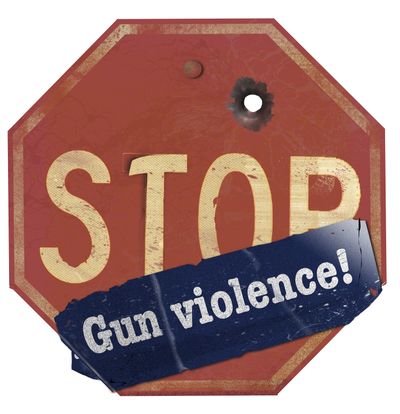Commentary: Gun violence is causing an anxiety crisis: How to help yourself and your kids

I remember my first experience with an active shooter. Last summer, I was on the rooftop terrace of a hotel where I was attending a work conference. A hotel employee arrived, breathless, and told us we couldn’t leave. Downstairs in the lobby, there was a man with a gun. We locked the doors and waited in silence until word came that the shooter had been apprehended.
That was the first time I felt my fear surge due to a gun threat. But it wasn’t the last. In the 10 months since then, I experienced two more active shooter incidents, each more frightening than the last.
These experiences have had a significant impact on me. As a pediatrician for 20 years, I know the signs of anxiety and trauma in kids. Now, I see them in myself. I hesitate to commute to my office in Midtown Atlanta, where I experienced the second and third events. I say no to most concerts, festivals and even movies in theaters because large public gatherings make me nervous. When I drop my kids off at school, I can’t help but think of the possibility that I may never see them again.
As it turns out, I’m not alone. In April, a study by the Kaiser Family Foundation reported that 84% of U.S. adults have taken at least one precaution to protect themselves from gun violence, such as avoiding crowded events, staying away from public transit, or purchasing another type of weapon, like a knife or pepper spray.
We’ve become a nation under siege, with the mental health effects of gun violence exponentially multiplying its impact.
As of this summer, there have been more than 500 mass shootings in the United States this year – more than one per day, according to the Gun Violence Archive, which defines a “mass shooting” as one in which at least four people are hurt or killed. The rate of mass killings is higher this year than in any year since the data was first recorded in 2006, as tracked by a USA Today and Associated Press database.
And of course, Americans aren’t exposed to gun violence only through mass shootings. A recent survey found that one in five adult Americans has been threatened with a gun, and one in six has witnessed someone being shot.
For children, exposure to gun violence has reached an all-time high. Among America’s kids, gun fatalities rose 50% between 2019 and 2021, making firearms the number one cause of death for children and teens in the United States.
The ripple effects extend far beyond the many lives lost. Every incident leaves its impact on a family, a school, a workplace, or beyond.
According to the National Center for Post-Traumatic Stress Disorder, most survivors and first responders to mass violence experience symptoms of acute stress following the event. For many, these symptoms decrease over time. But for some, the impact can be severe and long-lasting.
This is especially true for children.
Experts have found that toxic stress from an adverse childhood event – like witnessing violence – can affect a child’s brain development and change how the body reacts to stress. Kids who experience such an event are more likely to develop chronic health problems, mental illness and substance abuse in adulthood. Those who’ve been close to gun violence show increased rates of depression, panic attacks and suicidal thoughts. They’re more likely to struggle with learning and drop out of school.
It’s not hard to see how outcomes like these wend their way into the broader community. Yet the politics surrounding gun violence remain stuck. After every mass shooting, policy proposals founder, and lawmakers express sadness and outrage – then move on.
But an increasing number of Americans can’t move on. Instead, they internalize the trauma and carry it into their daily lives.
We must help ourselves and our children cope. How should we handle feelings of helplessness and fear?
Here are the suggestions I offer my patients’ parents.
First, find your own calm. Data shows a correlation between parental stress levels and children’s physical symptoms of stress, like stomachaches or trouble sleeping.
Second, communicate with your child. There’s an appropriate way to talk about gun violence with even the youngest elementary-school kids. The National Association of School Psychologists has an age-by-age guide to help parents with this difficult discussion.
Third, limit news consumption. Numerous studies have found that exposure to news about mass violence increases viewers’ anxiety. I check the news only once a day in the morning. Silence news alerts, and consider turning off your phone.
And finally, take action. That could mean enrolling in a gun safety course, joining an advocacy group, helping teachers, or contacting politicians. Besides the practical effects, activities that make you feel empowered can have significant mental health benefits.
We must protect ourselves from the mental health impact of gun violence. Otherwise, we risk becoming mired in a cycle of fear and anxiety that causes even more harm. As a doctor and a mother, I know we can do better.
Hansa Bhargava, M.D., is chief medical officer of Medscape Education, a board-certified pediatrician for over 15 years, and a member of the American Academy of Pediatrics’ Council on Communications and Media.